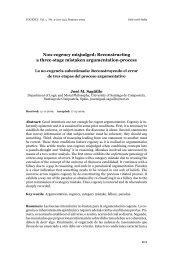Cogency v2 n2
Cogency v2 n2
Cogency v2 n2
You also want an ePaper? Increase the reach of your titles
YUMPU automatically turns print PDFs into web optimized ePapers that Google loves.
Wittgenstein and the Logic of Deep Disagreement / D. M. GODDEN & W. H. BRENNER<br />
Agreement in Judgment: Complete & Incomplete<br />
1<br />
Concepts : judgments :: measures : measurements. But, just as a method<br />
of measurement requires a certain uniformity in the results of measurement,<br />
so too a way of judging requires a measure of “agreement in judgments.”<br />
26 How much agreement is required depends on the type of concept<br />
involved, as shown by the kind use a term has in the language.<br />
Arithmetic is characterized by a virtually unanimous agreement in the<br />
results of calculations performed by people acknowledged to have mastered<br />
certain techniques (addition, subtraction, etc.) In contrast, psychological<br />
(and ethical) concepts allow far more “indeterminancy in judgment.” Learning<br />
to apply such concepts is a matter not of mastering a technique but of<br />
learning “good judgment,” by way of paradigm examples and “rules of<br />
thumb.” 27 2<br />
Is fear of relativism at the back of the worry about the persistence of deep<br />
disagreements? Relativists don’t seem to respect the law of excluded middle:<br />
they appear to “want it both ways.” But Wittgensteinians aren’t enemies of<br />
reason in the sense that they want to question the law of excluded middle.<br />
They do, however, want to point out that it is not equally applicable to everything<br />
we call a judgment. For our judgments do not all have a determinate<br />
(p v ~p) sense in every context. In some cases, our judgments are “better<br />
or worse” (plausible or implausible, insightful or “just weird”)–rather<br />
than “true or false” or “calculated correctly or incorrectly.” To highlight one<br />
important example, such indeterminacy is to be found in some of our judgments<br />
about the feelings of others.<br />
237-38: “The limit of the empirical is–concept-formation” and ibid. p. 379: “The limits of<br />
empiricism [and pragmatism]–Do we live because it’s practical to live? ... think because<br />
thinking is practical?”<br />
26<br />
Wittgenstein argues this point at PI §§ 142, 242 and in PI IIxi, pp. 226 ff.<br />
27<br />
See PI, pp. 227-28.<br />
71








